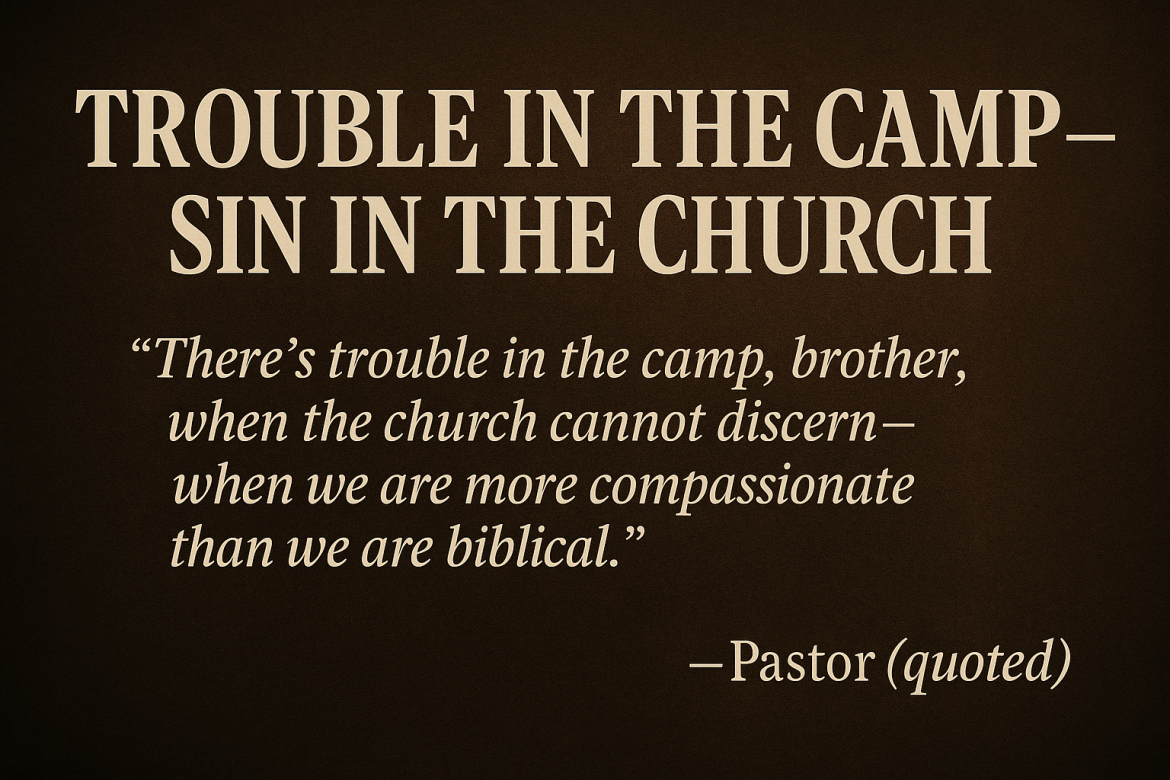Five Things We Will Learn
- Why biblical discernment must guide the Church above cultural compassion.
- The difference between being kind and being compromising.
- How hidden sin invites defeat within the Body of Christ.
- What Scripture teaches about confronting sin within the Church.
- Why spiritual leaders must guard the camp for the sake of holiness and revival.
The Pastor’s Warning: Compassion Without Conviction
“There’s trouble in the camp, brother, when the church cannot discern—when we are more compassionate than we are biblical.”
— Pastor (quoted)
In this sobering statement, a pastor captures a crisis that has quietly crept into much of the modern Church: compassion has replaced conviction.
In an age when “kindness” is often mistaken for acceptance and “love” confused with silence, the Church risks losing her ability to discern between good and evil.
Scripture warns us of this very thing:
“Woe to those who call evil good and good evil, who put darkness for light and light for darkness.” — Isaiah 5:20
When compassion is divorced from truth, it ceases to be love at all. Jesus’ compassion was never tolerance for sin—it was mercy coupled with a call to repentance.
Sin in the Camp: The Danger of a Numb Conscience
The pastor’s testimony is not theoretical—it’s pastoral reality.
“I’ve had people in this church who are sleeping together out of wedlock tell me, ‘Well, my conscience doesn’t bother me.’ That’s because it’s dead.”
The Apostle Paul foresaw this danger:
“The Spirit clearly says that in later times some will abandon the faith and follow deceiving spirits… having their consciences seared as with a hot iron.” — 1 Timothy 4:1–2
When believers lose the ability to be convicted by the Holy Spirit, sin becomes normalized, and holiness becomes optional. That is how “trouble in the camp” begins—when the fear of the Lord is replaced by the fear of offending people.
And that lack of conviction, as the pastor describes, spreads quickly:
“We’ve had women in this church get pregnant out of wedlock, only to have church members congratulate them. At some point, this preacher can’t take it anymore. Why would you congratulate someone who’s expecting a baby out of wedlock?”
There is nothing wrong with loving and caring for a struggling mother—indeed, Scripture commands it—but to celebrate the sin that led to brokenness is to confuse mercy with approval. As Paul said:
“Shall we go on sinning so that grace may increase? By no means!” — Romans 6:1–2
Love must be redemptive, not permissive.
The Shepherd’s Responsibility: Guarding the Flock
“I’m not mad. I’m pastoring my church. And I’m the one who’s going to stand before my Great Shepherd one day and give an account for everything I say and everything written in this Book.”
A true shepherd understands accountability. The pastor’s words echo those of the Apostle Paul:
“Keep watch over yourselves and all the flock… Be shepherds of the church of God, which he bought with His own blood.” — Acts 20:28
A faithful pastor cannot ignore sin without betraying the very One who entrusted him with the flock. When leaders choose comfort over correction, they abandon their post and allow the enemy to creep in.
Joshua faced this same crisis after Israel’s defeat at Ai:
“Israel has sinned… That is why the Israelites cannot stand against their enemies.” — Joshua 7:11–12
Hidden sin was the reason for national defeat. Only after sin was confronted and cleansed could victory return to the camp.
This pastor’s stance echoes that ancient truth:
“At some point, somebody has to make a decision: You can’t do that here. If you want to go somewhere else and they don’t care, that’s between you and them. But you can’t do it here, because I can’t allow sin in the camp. I can’t let the devil get in among the [this church].”
This isn’t legalism—it’s love. A shepherd who refuses to draw boundaries leaves the sheep unprotected from wolves.
Biblical Compassion Is Not Compromise
Many confuse compassion with compromise. The pastor made it clear:
“This is the most compassionate and kind church I know anywhere. That’s not what upsets me. What upsets me is when people don’t have enough spiritual sense to recognize that sin was committed.”
True compassion does not celebrate sin—it prays for deliverance from it.
Jesus loved the woman caught in adultery, but He also said, “Go and sin no more” (John 8:11).
To love someone biblically is to desire their freedom from sin, not their comfort in it.
Anything less is sentimentalism disguised as mercy.
The apostle Paul instructed the Church in Corinth not to boast in tolerance but to restore through truth:
“And you are proud! Shouldn’t you rather have gone into mourning…?” — 1 Corinthians 5:2
We are called to mourn sin, not normalize it.
You Can’t Represent Christ While Living in Sin
The pastor continued:
“We’ve had people commit sin in the choir, and we’ve had to ask them to step down. Is that being hard-hearted? No—it’s being biblical. You’re not supposed to stand up and act like you’re living right when you’re not. You can’t represent Christ while living in sin.”
This echoes Paul’s command to Timothy:
“Set an example for the believers in speech, in conduct, in love, in faith and in purity.” — 1 Timothy 4:12
Serving in public ministry is not a right; it’s a responsibility.
Grace forgives us, but grace also transforms us. To represent Jesus while living in rebellion against Him is spiritual hypocrisy, and hypocrisy erodes the Church’s witness faster than persecution ever could.
Jesus Himself rebuked religious hypocrisy harshly, but He extended mercy to repentant sinners instantly. The difference is humility before the Word of God.
Sin Is Still Sin
The pastor laid it out clearly:
“Folks, having babies out of wedlock is sin.
Sleeping together outside the bonds of marriage—sin.
Lying, stealing, cheating—sin.
Loving money—sin.
Never being satisfied, no matter what you have—sin.”
That list sounds simple, but in today’s culture, even reading it out loud would offend many. Yet Scripture does not apologize for calling sin what it is.
“Do not be deceived: Neither the sexually immoral nor idolaters nor adulterers nor thieves nor the greedy nor drunkards nor slanderers nor swindlers will inherit the kingdom of God.” — 1 Corinthians 6:9–10
The good news is in the next verse:
“And that is what some of you were. But you were washed, you were sanctified, you were justified in the name of the Lord Jesus Christ.” — 1 Corinthians 6:11
God does not expose sin to shame us; He exposes it to heal us. Repentance opens the door for redemption.
A Call to Repentance and Restoration
The Church cannot represent Christ while living contrary to His Word. As the pastor declared:
“At some point, somebody has to make a decision.”
That decision is one every generation must make—will we fear God or man?
When a church chooses to be more “compassionate than biblical,” it forfeits the anointing that breaks the yoke.
“It is time for judgment to begin with God’s household.” — 1 Peter 4:17
This is not a call to harshness, but to holiness. Revival always begins with repentance.
When sin is exposed and confessed, grace flows freely again.
There is hope for every believer, no matter how deep the failure—but restoration only comes through repentance, not applause for wrongdoing.
Conclusion: Keep the Camp Holy
We live in an age when the Church must recover her discernment. Being “nice” cannot replace being “holy.” Holiness means being set apart from the world and from the ways of the world. — Jame 4:4 True revival will never come through emotional tolerance—it will come through the cleansing fire of repentance and the return to God’s Word.
The Church must once again echo Joshua’s cry:
“Consecrate yourselves, for tomorrow the Lord will do amazing things among you.” — Joshua 3:5
Only when the camp is holy will the glory return.




